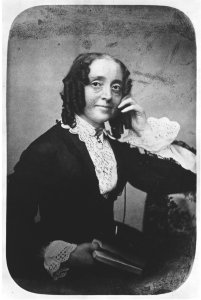Ernestine Rose
| Ernestine Rose | |
|---|---|
 |
|
| Born |
Ernestine Louise Polowsky January 13, 1810 Piotrków Trybunalski, Congress Poland |
| Died | August 4, 1892 (aged 82) Brighton, England |
| Other names | Ernestine Louise Polowsky |
| Known for |
Women's Rights Women's Suffrage Feminism Civil Rights Atheism |
Ernestine Louise Rose (January 13, 1810 – August 4, 1892) was a freethinker, a feminist, and an abolitionist. Better known that either Elizabeth Cady Stanton or Susan B. Anthony in the 1850s, she was one of the major intellectual forces behind the women's rights movement in nineteenth-century America.
She was born on January 13, 1810, in Piotrków Trybunalski, Congress Poland, as Ernestine Louise Potowska. Her father was a wealthy [[rabbi]. There is no information about her mother. [Anderson, Prologue]
At the age of five, Rose began to "question the justice of a God who would exact such hardships" as the frequent fasts that her father performed. As she grew older, she began to question her father more and more on religious matters. He told her, "Little girls should not ask questions," unlike little boys who were supposed to. She later said that she dated her disbelief and women's rights principles from that event. {Underwood, 268] By age fourteen, she had lost her faith in Judaism.
When she was sixteen her mother died and left her an inheritance. Her father, without her consent, betrothed her to a Jewish friend of his, to "bind her more closely to the bosom of the synagogue." Rose, not wanting to enter a marriage with a man she neither chose nor loved, confronted him, professing her lack of affection towards him and begging for release. However, Rose was a woman from a rich family, and he denied her plea. Rose traveled to the secular civil court, where she pleaded her case herself. The courts ruled in her favor, not only freeing her from her betrothal, but ruling that she could retain the full inheritance she received from her mother. Although she decided to relinquish the fortune to her father, she gladly took her freedom from betrothal. She returned home only to discover that in her absence her father had remarried, to a sixteen-year-old girl. The tension that developed eventually forced her to leave home at the age of seventeen.
Rose then traveled to Berlin, where she found herself hampered by an anti-Semitic law that required all non-Prussian Jews to have a Prussian sponsor. She appealed directly to the king and was granted an exemption from the rule. Soon afterward, she invented a room deodorizer, which she sold to fund her travels.
She traveled to Belgium, the Netherlands, France, and finally England. Her arrival in England was less than smooth, however, as the ship in which she was sailing wrecked. Although Rose did make it to England safely, all her possessions had been destroyed, and she found herself destitute. In order to support herself, she sought work as a teacher in the languages of German and Hebrew and she continued to sell her room deodorizers. While in England, she met Robert Owen, a Utopian socialist, who was so impressed by her that he invited her to speak in a large hall for radical speakers. In spite of her limited knowledge of English, the audience was so impressed that from then on her appearances were regular. She and Owen were close friends, and she even helped him to found the Association of All Classes of All Nations, a group that espoused human rights for all people of all nations, sexes, races and classes. During her time there she also met William Ella Rose, a Christian jeweler and silversmith, an Englishman and an "Owenite". They were soon married by a civil magistrate, and both made it plain that they considered the marriage a civil contract rather than a religious one.
...
Wikipedia
